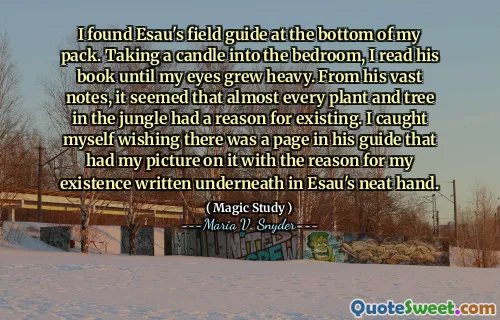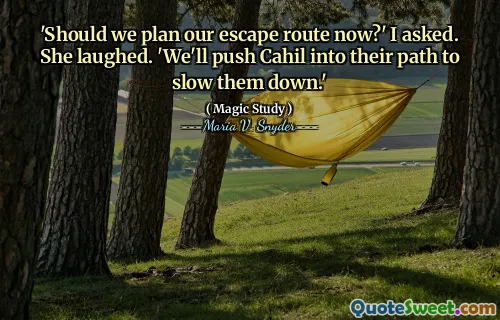
I found Esau's field guide at the bottom of my pack. Taking a candle into the bedroom, I read his book until my eyes grew heavy. From his vast notes, it seemed that almost every plant and tree in the jungle had a reason for existing. I caught myself wishing there was a page in his guide that had my picture on it with the reason for my existence written underneath in Esau's neat hand.
This quote beautifully encapsulates a universal human longing for purpose and belonging. The narrator’s discovery of Esau's field guide—a detailed catalog of the jungle's flora—serves as a metaphor for understanding the world and our place within it. Each plant and tree having "a reason for existing" suggests a natural order and intrinsic purpose woven into the fabric of life. Yet, despite the comfort such knowledge provides about the environment, the narrator's yearning for a personal "page" highlights the deeper quest for self-understanding and meaning. This desire to have one's existence justified and documented "in neat hand" reflects an intimacy and certainty the narrator craves—a wish to be recognized and valued by an external source of wisdom.
What is particularly striking is the contrast between the tangible knowledge contained in the field guide and the intangible, often elusive understanding of our own lives. Nature, with its clearly defined roles and functions, offers a stark comparison to the complexity and ambiguity of human existence. The warm imagery of reading by candlelight introduces a tone of introspection and calm, emphasizing the solitary nature of this personal journey toward self-awareness.
Within the context of Magic Study, this passage may symbolize the intersection of structured knowledge and personal growth. Just as the guide maps the natural world, individuals yearn for clarity in their own stories amid the uncertainties of life. The quote resonates with anyone who has sought to comprehend their unique contribution to the grand scheme, underscoring the timeless and shared human experience of searching for identity and purpose.









